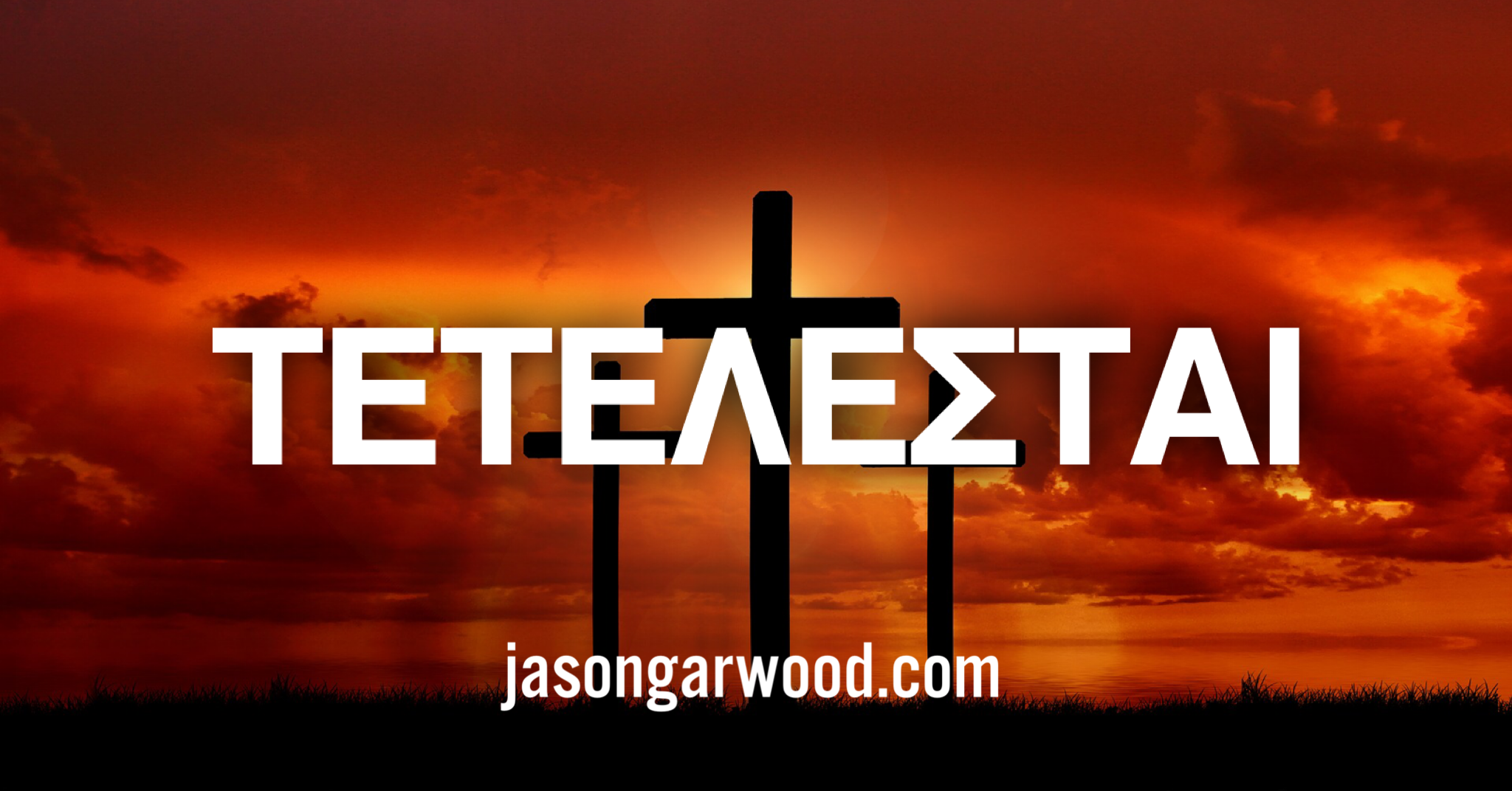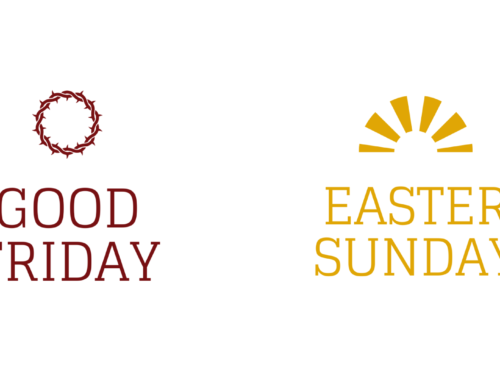Hanging on the cross, Jesus said one final word: tetelestai. This word, translated as “It is finished,” is oftentimes the subject of curious speculation. What was finished? What is He talking about? His life: was that finished? The work of redemption: was that complete? Just what does John 19:30 mean?
Therefore when Jesus had received the sour wine, He said, “It is finished!” And He bowed His head and gave up His spirit. (Jn. 19:30)
Contrary to said speculations, I am convinced that what Jesus is getting at has everything to do with the action before the statement. Notice the verse above: Jesus had received the “sour wine.” To be sure, there is prophetic significance regarding the hyssop branch, but you can look that up on your own. What I find interesting is that there is some connection to the sour wine and the “finishing” stuff. Could Jesus have said “It is finished” before receiving the wine? Is this simply a detail John noticed as history played out, and thus it has no real theological significance? Or was this final detail the very point?
I think it was the point. Long before we say that Jesus finished the work of redemption; long before we get to the doctrines of grace… we have something else to consider.
Note some of the things that happened beforehand:
While they were eating, Jesus took some bread, and after a blessing, He broke it and gave it to the disciples, and said, “Take, eat; this is My body.” And when He had taken a cup and given thanks, He gave it to them, saying, “Drink from it, all of you; for this is My blood of the covenant, which is poured out for many for forgiveness of sins. But I say to you, I will not drink of this fruit of the vine from now on until that day when I drink it new with you in My Father’s kingdom.” (Matthew 26:26-29 NASB)
This is no small statement, and it is certainly something we should consider. Is the “Father’s kingdom” language all about the pre-millennial coming of Christ? Is this “kingdom” business only going to come about when Christ returns in the future? Will Jesus descend from heaven, having Raptured His Bride off the planet for a seven-year period, to sit on a literal throne in literal Jerusalem and then drink the fruit of the vine? In short: no.
Some theologians speculate about the passover meal itself, suggesting that Jesus didn’t drink the Fourth Cup because Judas had interrupted the ritual, and thus Jesus says that He won’t drink this Fourth Cup until He drinks it new in His Father’s kingdom. Scott Hahn, a Roman Catholic, makes this connection in his book The Fourth Cup. I’ve read Hahn’s book and find it compelling. (Shocking, right? A Protestant learning something from a Romanist? The nerve…)
The connection here is this: Jesus made it plain that He wouldn’t drink of the fruit of the vine (wine) until He drinks it new “with you” in “My Father’s kingdom.” The you refers the disciples to whom He is speaking. On the cross, Jesus was offered wine several times but declined… until this final moment when Scripture was to be fulfilled. For the apostle John, this moment is His passover celebration (He has no Upper Room story) because it is in this moment that Jesus is the passover lamb who communes with His saints in His Father’s kingdom. Yes, Jesus accomplished once and for all our redemption–Hebrews makes this plain. Yes, Jesus is the Lamb of God who takes away the sins of the world. And yes, Jesus has come to establish His Father’s kingdom.
As a representative of the Godhead, Jesus takes supremacy in this moment on the cross crying out, “It is finished” because it was here, having partaken of this kingdom-wine, Jesus initiates Project Save the World. This is the Fourth Cup. The Passover celebration is now complete (“finished”) because He is the lamb slain before the foundations of the world (Rev. 13:8). The Kingdom has now come. In John’s language, this is the “hour” which had not yet come, but is now here (cf. John 2:24; 4:21, 23; 5:25, 28; 7:30; 8:20; 12:23, 27; 13:1; 16:4, 25, 32; 17:1). In Mark’s manner of speaking, the kingdom was “at hand,” and is now here.
Jesus said what He meant, and meant what He said: He would drink with them in His Father’s kingdom, and such was the reality of the cross. It is finished. The work of the Kingdom–all the healings, all the preaching, all the gathering of sheep–was now complete. We are justified by His blood and His resurrection (see Romans 5:9; cf. Romans 4:25). We are all, then, participants in the newly formed passover feast of Christ’s glorious Kingdom. And to top things off, we have this beautiful passage in Revelation 19:11-16 —
And I saw heaven opened, and behold, a white horse, and He who sat on it is called Faithful and True, and in righteousness He judges and wages war. His eyes are a flame of fire, and on His head are many diadems; and He has a name written on Him which no one knows except Himself. He is clothed with a robe dipped in blood, and His name is called The Word of God. And the armies which are in heaven, clothed in fine linen, white and clean, were following Him on white horses. From His mouth comes a sharp sword, so that with it He may strike down the nations, and He will rule them with a rod of iron; and He treads the wine press of the fierce wrath of God, the Almighty. And on His robe and on His thigh He has a name written, “KING OF KINGS, AND LORD OF LORDS.”
The passage here speaks not of the Second Coming of Christ, but the First Coming of Christ: His bloody cross and empty tomb stood as the moment when this King was crowned. It was truly the day the revolution began. He does not ever need to return to the earth to be crowned King: He was already crowned King by virtue of His death and resurrection. As Daniel says, He came to the Ancient of Days (Daniel 7:13-14). He has inherited the kingdoms of the earth and was given dominion (Psalm 72:8) in that moment. Revelation 19 is the Lamb’s triumphant wedding procession. And as Christians who affirm tetelestai, we join this conquering King in history because this procession is the mission of church, the ingathering of all nations and languages. Satan is bound so that he may not stop the ingathering.
The Victor we hail rides His white horse (white horses are ridden post-victory) into the world destroying enemies and establishing His Kingdom among all the peoples in the hinterlands. On what basis does this happen?
Tetelestai.






Leave A Comment